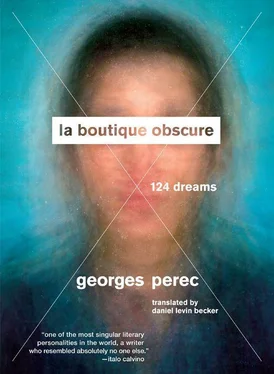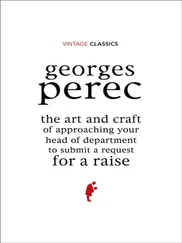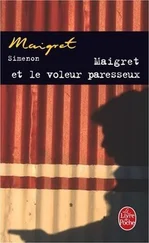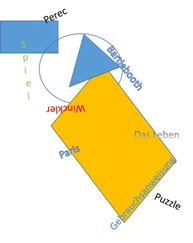The main character is a Byron who wants to be a Malatesta, which is to say a warlord who crushes his vassals under the pretext of bravery.
In one act, I am an actor: I am to shut off all the lights of a large house and I know that at the death of the lights something terrible will happen. This expectation triggers a light panic in me. But nothing happens.
Later, I’m laid out on a bed with a woman whom I eventually (surprised and stunned as though I had long dreamed of this impossible encounter) recognize as C. We are both overcome with an indescribable pleasure (even the word “ecstasy” gives only a distant, impoverished sense of it). I am on my back. C. mounts me, but she makes a quick movement that jolts me out of her. She begins to moan softly, which quickly excites me again. She kneels and, while she props herself up from behind, I enter her again. Coupled this way, we begin to creep on the carpet.
In the next room there are two men (one of them is F.). They see us, but it doesn’t bother us. It’s part of the play.
The next act takes place in the country. The heroine has become an ugly old woman. She is raising a bull, which we see escaping some kind of ditch. It doesn’t seem real. One character remarks that it would take only a slightly wild cat to take it down.
I have a long discussion with the man seated next to me, which ends up irritating me. He thinks the show is good because it demonstrates that the lord is a bastard, and this is what theater must demonstrate until there are no lords left. I don’t know how to respond. I think the show is awful, but that doesn’t mean the man next to me isn’t right, which makes me more and more uncomfortable.
Between each act, the characters come on stage, wearing outlandish hats. I remark to P. that, the larger the hats, the longer the actors strut about in them, a typical example of directorial demagogy.
The last act is a celebration. Everyone in the audience is invited to come on stage and follow a circuit lined with different attractions (including a game of ping pong). At the exit, they pass in front of a buffet where they are served a cup of coffee, black, no sugar.
After the performance, I called on the director and his wife (who was one of the actresses). I tried to make it clear that I didn’t care for the play. The director came back with a sheaf of papers; it was in these texts, he told me, that he found it was permissible to mix Byron and Malatesta.
I flip through the papers. Among them, I find a “Trois Suisses” leaflet advertising three leather telephone cradles. I was looking for exactly such furnishings, and they seem to cost much less than expected; meanwhile, the director, his wife and a third person are indeed seated (having removed their shoes) in such furnishings.
I wake up. Or I dream that I wake up.
Much later, it seems — another day — I am in the suburbs with friends of recent minting, with P. and one of my friends, maybe R.
I begin to recount my dream to them. Everything is perfectly clear. I write it down, bit by bit, on slips of paper that I take from my pocket.
I begin the story of my dream backwards, with the part about the telephone cradles.
We leave.
Fruitless search for a taxi, somewhere by a port of Paris …
P., exhausted, has fallen into a sort of landfill filled with yellowish mud, where she stays, facing the ground, motionless.
Half laughing, half worried, I call to her, shouting her name:
“Lise! Lise!”
I realize that I have made a mistake and I call her again, correctly rectifying her name.
Very angry, P. stands up and says to me:
“If you want me to feed you, give me the name I gave to my mother because she fed me!”
I realize that we’re hungry. I search in my pockets and bring out — joy! — thin slices of Chester cheese: the same slices I thought I was writing my dream on.
Dives
Two of my plays are being performed “urgently.”
The older one isn’t going too badly, but the new one! All of my actors forget their lines. We have to stop the run. Irritation.
Very elderly people pop up like shadows and begin to applaud. Is it because they think it’s over, or because they’ve just arrived?
We run this new play again, but this time to music. A musician is directing the performance with the help of a “mixer” and is doing an excellent job of it.
All of this might be happening in Dampierre.
Conversation on a lawn. One participant is wearing camouflage fatigue pants. We share a common memory (between us and anyone who has jumped in a parachute): the difficulty of jumping with a hatchet at one’s belt. Many accidents.
The game goes on and on
Someone I was with leaves
I no longer know where I am, where I’m going
Furious, I go to the hotel office and demand — in French — that I be shown my room. The customs officer understands and speaks French: she will show me the way.
I get lost in a maze of tiny staircases.
It turns out I’m in a brothel. Three obese, cheerful women attack me in one of the rooms I explore while looking for my own. I run away. Another woman chases me (this isn’t so bad, actually).
My shoes
Did I lose my shoes? How did I lose my shoes?
It was at a large carnival: you could take a spin in the air by mooring to the end of a rope attached to a ball and chain, or to balloons — the classic gag where the balloon salesman is carried away by his balloons.
The trip ended on a very high platform. To get back to ground level, you could — this was one of the most popular attractions at the carnival — slide through a huge fabric tunnel (like an enormous sleeve filled with folds, like a gigantic spindly intestine): they told me it was very impressive and absolutely safe.
It was quite agreeable, in fact (freefall, but totally safe) and, indeed, perfectly harmless.
Leaving this apparatus, very satisfied, I went to sit down on a bench. It was then that I noticed I had lost my shoes.
I call the employee responsible for the bottom and ask him to go check if my shoes haven’t wound up at the bottom of the apparatus. He tells me this is not possible. I insist, adding that these are lace-up boots, nearly new (someone just gave them to me), easily recognizable. But the employee continues to swear this never happens, could never happen. I have to insist for a long time before he decides to go look.
Several times he comes back carrying shoes that are obviously not mine. Finally he finds one, then the other.
A detail I had not yet spotted: at the tips of my soles there are two little metallic pegs that allow the boots to be instantly adapted to ice skates.
No. 111: March 1972 (Blevy)
Reconstruction of a choice
(whose very title indicates the degree to which everything is erased. It concerned a whole series of selections: which side to sleep on, which ear to choose, which lamp to light?)
After a confusing interval, this becomes:
the path of the father or the path of the mother?
No. 112: March 1972 (Blevy)
Books
In the coatroom of my laboratory there is a small window that looks out onto the back of a used bookstore. Leaning out this window, I see a whole pile of books presented such that they look like a single work encased in cardboard with a large black stain on the spine. The books form a set, which looks homogenous to me. The theme is a contemporary school with a medieval name — the Gay Sçavoir or the Saincte Sapience — which name is written in delicate calligraphy in black pencil. Scattered in this pile are some large Derrida books, an art book (maybe Claude Roy) and some thin pamphlets. I know the whole thing belongs to the collection of a friend of J.P., and it strikes me that these are exactly the books I’ve been searching for for a long time. The bookseller’s price is extremely modest, given the value and rarity of the titles, but I can’t quite make it out (29 francs? 37 francs?). I would obviously go see the bookseller to make a deal, but of course the store is closed.
Читать дальше












